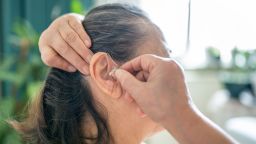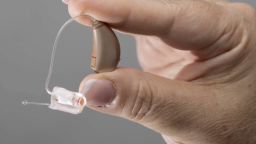Does your doctor and hospital have a
protocol to test for hearing loss and maybe remove one of the causes of
dementia post stroke? If not, you don't have a functioning stroke doctor or hospital.
hearing loss (11 posts to February 2013)
Your risk of dementia, has your doctor told you of this?
1. A documented 33% dementia chance post-stroke from an Australian study? May 2012.
2. Then this study came out and seems to have a range from 17-66%. December 2013.`
3. A 20% chance in this research. July 2013.
4. Dementia Risk Doubled in Patients Following Stroke September 2018
The latest here:
Up to 8% of dementia cases can be prevented by treating hearing loss, study finds | CNN
Treating hearing loss could mean reducing the risk for dementia, according to a new study.
Hearing loss may increase the risk for dementia, but using hearing aids lowered the risk so it’s similar to those without hearing loss, according to the study published Thursday in The Lancet.
Researchers followed more than 437,000 people in a cohort from the UK Biobank, a large biomedical database and research resource that follows residents long term. They looked at each person’s risk for dementia, self-reported use of hearing aids and medical records to see if the person developed dementia, the study said.
“The evidence is building that hearing loss may be the most impactful modifiable risk factor for dementia in mid-life,” corresponding study author Dongshan Zhu, professor at Shandong University in China, said in a statement. “Our study provides the best evidence to date to suggest that hearing aids could be a minimally invasive, cost-effective treatment to mitigate the potential impact of hearing loss on dementia.”
The research accounted for other factors, including loneliness, social isolation and depression, but found that untreated hearing loss still had a strong association with dementia.
“The paper also explores some of the possible reasons as to how hearing aids may work, tending to (favor) the idea that they are effective because they reduce the cognitive effort involved in hearing and/or they reduce the effects of sensory deprivation if you can’t hear,” Tom Dening, a professor of dementia research at the University of Nottingham in the United Kingdom, said in a statement. Dening was not involved in the research.
A 2020 Lancet commission on dementia prevention, intervention and care suggested hearing loss may be associated with around 8% of dementia cases, but this study found that the use of hearing aids reduced the risk to levels similar to people without hearing loss, the study said.
The results support findings from a December meta-analysis published in JAMA Neurology that people with hearing loss who wore devices to help performed 3% better on cognitive scores in the short term.
Underuse of hearing aids
Dening, who said he recently began wearing hearing aids, said he hopes that these findings will help him care for patients better.
“We need to use studies like this to encourage the public not to be embarrassed by hearing problems,” he said, “and to seek assessment and treatment sooner rather than later.”
With both hearing loss and dementia, acting sooner is better, said Lise Hamlin, public policy director of the Hearing Loss Association of America.
“Early adoption of hearing aids could help people hold onto their jobs, communicate better at home with family and friends, and … remain (in) active their communities,” she said.
Many adults need hearing aids, but not enough use them, said Dr. Karina De Sousa, a postdoctoral research fellow in the department of speech-language pathology and audiology at the University of Pretoria in South Africa. She was the lead author of a new study looking at over-the-counter hearing aids.
“A recent study showed that only 15% of US adults with hearing loss use hearing aids,” De Sousa said. “There are many potential reasons people opt not to get hearing aids, but one issue has been the accessibility and affordability of the devices.”
More accessible options
But De Sousa’s study offers hope of more accessibility.
This small, preliminary study, published Thursday in the journal JAMA Otolaryngology — Head & Neck Surgery, found that a self-fitting, over-the-counter hearing aid could be as good of an option for some people as those fitted by an audiologist.
Its results follow the US Food and Drug Administration’s August decision to allow people with mild to moderate hearing loss to buy hearing aids online or over the counter without a prescription.
“The establishment of an OTC (over-the-counter) hearing aid category by the FDA opens a new range of options for people with hearing loss,” De Sousa added in an email.
The Hearing Loss Association of America still supports multiple avenues for addressing hearing loss, Hamlin said.
Some people may find a hearing aid over the counter that works for them, but others may need the help of a health care professional, she added.
“These devices are very new,” Hamlin said. “It’s great to hear that at least this one tested device (in the study) provides such benefit.”
Still, she advises people to do their homework and consider their specific needs first — and encourages them to use her organization’s online resources — which can help determine whether you need a hearing aid, what to look for in one and what questions to ask your doctor — before making a purchase.
“One thing to remember is that OTC hearing aids are not a one-size-fits-all option,” De Sousa added. “If you do not meet the specified criteria for wearing an OTC hearing aid, I would recommend seeking the help of a qualified hearing professional.”


No comments:
Post a Comment